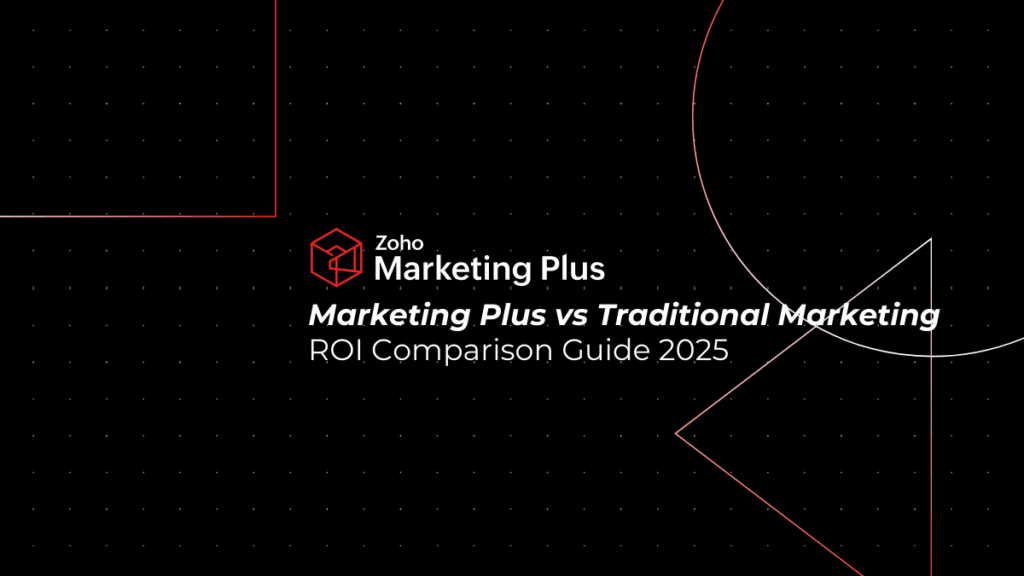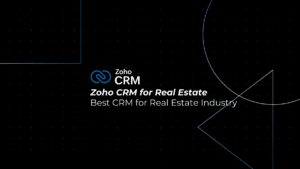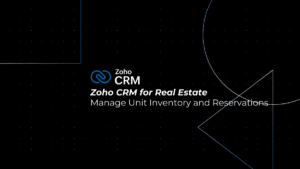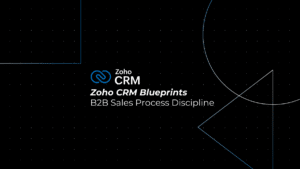The marketing landscape has transformed dramatically, forcing businesses to reevaluate their strategies and budget allocations. While traditional marketing plans have served businesses for decades, modern digital solutions like Zoho Marketing Plus are revolutionizing customer engagement and campaign management. This comprehensive comparison examines both approaches to help you determine which strategy delivers superior value for your investment in 2025.
Table of Contents
ToggleUnderstanding Zoho Marketing Plus
Zoho Marketing Plus represents the evolution of integrated marketing technology, combining multiple marketing channels and tools into a unified platform. This comprehensive solution encompasses email marketing, social media management, marketing automation, lead generation, customer relationship management, and detailed analytics within a single ecosystem.
Core Components of Zoho Marketing Plus
The platform integrates several essential marketing functions that traditionally required separate tools and vendors:
1. Unified Campaign Management: Create, execute, and monitor campaigns across multiple channels from a single dashboard
2. Advanced Customer Segmentation: Leverage behavioral data, demographics, and purchase history for highly targeted audience segments
3. Marketing Automation Workflows: Design complex automation sequences that nurture leads through personalized content delivery
4. Integrated Analytics Platform: Access real-time performance data across all marketing channels with customizable reports
5. Customer Journey Mapping: Visualize and optimize the entire customer experience from awareness through retention
Traditional Marketing Plans Explained
Traditional marketing plans involve conventional advertising methods, offline promotional activities, and basic digital presence management. These approaches encompass print advertising, radio and television commercials, direct mail campaigns, outdoor advertising, trade shows, and networking events.
Characteristics of Traditional Marketing Approaches
1. Channel-Specific Strategies: Each marketing channel treated as separate initiative with distinct budgets and timelines
2. Broad Audience Targeting: Mass marketing approaches reaching large audiences with generalized messaging
3. Linear Campaign Execution: Sequential development processes that limit flexibility and real-time optimization
4. Limited Performance Tracking: Reliance on delayed reporting and estimated metrics
5. Manual Process Management: Heavy dependence on human resources for campaign execution and monitoring
Cost-Effectiveness Analysis
Zoho Marketing Plus Investment Structure
Zoho Marketing Plus operates on a subscription-based model that provides predictable monthly costs and scalable pricing tiers. The platform’s integrated approach eliminates the need for multiple software licenses, reducing overall technology expenses while providing comprehensive functionality.
Initial implementation costs are typically lower than traditional marketing infrastructure setup. The platform requires minimal hardware investment and can be deployed rapidly without extensive technical resources or lengthy integration projects.
Ongoing operational costs remain stable and predictable, with the ability to scale usage based on business growth without proportional cost increases. The platform’s automation capabilities reduce labor requirements for routine campaign management activities.
Traditional Marketing Cost Considerations
Traditional marketing plans often involve significant upfront investments for campaign development, media buying, and creative production. These costs can fluctuate dramatically based on market conditions, seasonal demand, and competitive pressures.
Media buying costs continue rising across traditional channels, with limited flexibility to adjust spending based on real-time performance. Print, radio, and television advertising require long-term commitments that may not align with changing business priorities.
Creative development costs for traditional campaigns can be substantial, particularly when multiple versions are needed for different channels or audience segments. Production timelines often limit the ability to respond quickly to market opportunities or competitive threats.
Performance Measurement and Analytics

Zoho Marketing Plus Analytics Capabilities
Zoho Marketing Plus provides comprehensive analytics with several key advantages:
- Real-time Performance Dashboards: Track conversion rates, customer acquisition costs, and attribution across touchpoints
- Custom Reporting Features: Create tailored analysis of campaign effectiveness and audience behavior
- Business Intelligence Integration: Connect with BI tools for deeper insights into marketing impact
- Predictive Analytics: Identify trends and opportunities using machine learning algorithms
- Automated Optimization: Continuously improve campaigns based on performance data
- Attribution Modeling: Understand which marketing activities drive the best results
Traditional Marketing Measurement Challenges
Traditional marketing measurement faces several significant limitations:
- Estimated Metrics: Reliance on survey-based attribution lacks precision for optimization
- Delayed Reporting: Time lag between execution and results hinders agile marketing
- Limited Actionable Insights: Studies provide broad indicators but little immediate guidance
- Cross-channel Attribution Issues: Difficult to track results across combined traditional and digital elements
- Incomplete Customer Journey View: Cannot track progression from awareness through purchase
- Manual Data Collection: Time-consuming processes that introduce errors and inconsistencies
Scalability and Integration

Zoho Marketing Plus Advantages
Cloud-based Architecture: Rapid scaling without infrastructure investments
Automation Handling: Increased campaign volume without proportional resource requirements
Global Expansion Support: Multi-language capabilities and regional compliance features
Extensive Integration Options: Native Zoho ecosystem connections plus third-party integrations
API Access: Custom integrations for unique business requirements
Unified User Management: Single sign-on and appropriate access controls
Traditional Marketing Limitations
Resource-Intensive Scaling: Increased volume requires proportional staff and vendor increases
Geographic Expansion Barriers: Need for local vendor relationships and market expertise
Data Silos: Disconnected systems prevent comprehensive customer view development
Vendor Coordination Complexity: Managing multiple relationships and ensuring consistent messaging
Technology Update Challenges: Changes require coordinated updates across multiple systems
Industry-Specific Value Propositions
B2B Marketing with Zoho Marketing Plus
Zoho Marketing Plus excels in B2B environments where complex sales cycles and multiple decision-makers require sophisticated nurturing strategies. Account-based marketing features enable personalized campaigns for high-value prospects and enterprise customers.
Lead scoring and qualification automation help sales teams focus on the most promising opportunities while ensuring that marketing-qualified leads receive appropriate follow-up attention. Integration with CRM systems provides sales teams with complete interaction histories and behavioral insights.
Content marketing automation enables consistent thought leadership positioning through scheduled blog posts, social media content, and educational email sequences that build authority and trust over extended sales cycles.
E-commerce Optimization Benefits
E-commerce businesses benefit significantly from Zoho Marketing Plus behavioral tracking and transaction-based automation capabilities. Cart abandonment sequences, post-purchase follow-ups, and replenishment reminders drive additional revenue from existing customers.
Product recommendation engines leverage machine learning to suggest relevant items based on purchase history and browsing behavior. Inventory-based campaigns automatically promote products that need attention or seasonal items requiring increased visibility.
Customer lifetime value optimization through retention campaigns and loyalty program management helps e-commerce businesses maximize revenue from their customer base while reducing acquisition costs.
Service Industry Applications
Service-based businesses use Zoho Marketing Plus to nurture long-term client relationships and encourage repeat engagements. Automated client onboarding sequences ensure consistent experiences and reduce manual handoffs between departments.
Educational content sequences position service providers as industry experts while nurturing prospects through extended decision-making processes. Client feedback automation helps gather testimonials and identify expansion opportunities.
Appointment scheduling integration and reminder automation reduce no-shows while improving client satisfaction through timely communication and professional service delivery.
ROI Comparison Analysis
Zoho Marketing Plus ROI Factors
Zoho Marketing Plus delivers measurable ROI through multiple channels:
- Reduced Software Costs: Eliminate multiple tool subscriptions and vendor relationships
- Improved Campaign Efficiency: Automation reduces time and resources needed for execution
- Increased Lead Quality: Better targeting and nurturing improves conversion rates
- Enhanced Customer Retention: Automated engagement reduces churn and increases lifetime value
- Better Sales Efficiency: Qualified leads and complete interaction histories improve close rates
- Scalable Growth: Platform grows with business without proportional cost increases
Traditional Marketing ROI Challenges
- Limited Tracking Precision: Estimated metrics make accurate ROI calculation difficult
- Higher Production Costs: Expensive creative development and media buying requirements
- Audience Size Dependencies: Need larger audiences to achieve positive ROI
- Optimization Limitations: Cannot make real-time adjustments to improve underperforming campaigns
- Resource Intensive: Manual processes require significant ongoing investment
- Delayed Feedback: Long cycles between investment and measurable results
Implementation and Future-Proofing

Zoho Marketing Plus Implementation Benefits
Rapid Deployment: Cloud-based platform enables quick setup without infrastructure requirements
Minimal Learning Curve: User-friendly interface reduces training time and adoption barriers
Gradual Feature Rollout: Implement complexity incrementally as teams develop expertise
Regular Updates: Continuous platform evolution with new features and capabilities
Scalable Complexity: Support both simple campaigns and sophisticated automation workflows
Integration Support: Established protocols for connecting with existing business systems
Traditional Marketing Implementation Challenges
Future Sustainability Concerns: Cost increases may outpace business growth capabilities
Vendor Relationship Complexity: Multiple service provider coordination and contract management
Specialized Resource Requirements: Need for skills and expertise not available internally
Quality Control Demands: Brand consistency maintenance across multiple channels and vendors
Limited Adaptation Capability: Difficulty responding to changing consumer behaviors and technologies
Talent Availability Issues: Declining expertise in traditional marketing specialties
Key Decision Factors
When choosing between Zoho Marketing Plus and traditional marketing plans, consider these critical factors:
Choose Zoho Marketing Plus If:
- Scalability is Priority: Need marketing solution that grows with business requirements
- Data-Driven Decisions: Require detailed analytics and real-time optimization capabilities
- Resource Efficiency: Want to maximize marketing impact with limited human resources
- Integration Needs: Require seamless connection with sales, service, and operational systems
- Personalization Focus: Need to deliver customized experiences at scale
- Budget Predictability: Prefer stable, predictable monthly costs over variable traditional expenses
Consider Traditional Marketing If:
- Specific Demographics: Target audience primarily engages through traditional channels
- Regulatory Requirements: Industry mandates certain traditional marketing approaches
- Local Market Focus: Geographic constraints favor traditional local advertising methods
- Brand Legacy: Established brand identity closely tied to traditional marketing channels
- Immediate Reach: Need rapid, broad market penetration for time-sensitive campaigns
Conclusion
Zoho Marketing Plus offers compelling advantages over traditional marketing plans in efficiency, measurability, and scalability. The platform’s integrated approach eliminates many challenges associated with traditional marketing while providing superior insights and optimization capabilities.
The choice ultimately depends on specific business circumstances, but the trend toward integrated, data-driven marketing solutions continues accelerating. Zoho Marketing Plus provides a future-ready foundation that adapts to changing requirements while delivering measurable value from initial implementation.
Businesses that embrace comprehensive digital marketing platforms position themselves for success in an increasingly competitive and technology-driven marketplace.
Ready to Experience the Zoho Marketing Plus Advantage?
Still weighing your options between Zoho Marketing Plus and traditional marketing approaches? The best way to understand the true value proposition is to see the platform in action.
Watch our detailed Zoho Marketing Plus demonstration video
After watching the video, schedule your free consultation with PyramidBITS for a personalized analysis of your current marketing strategy.



